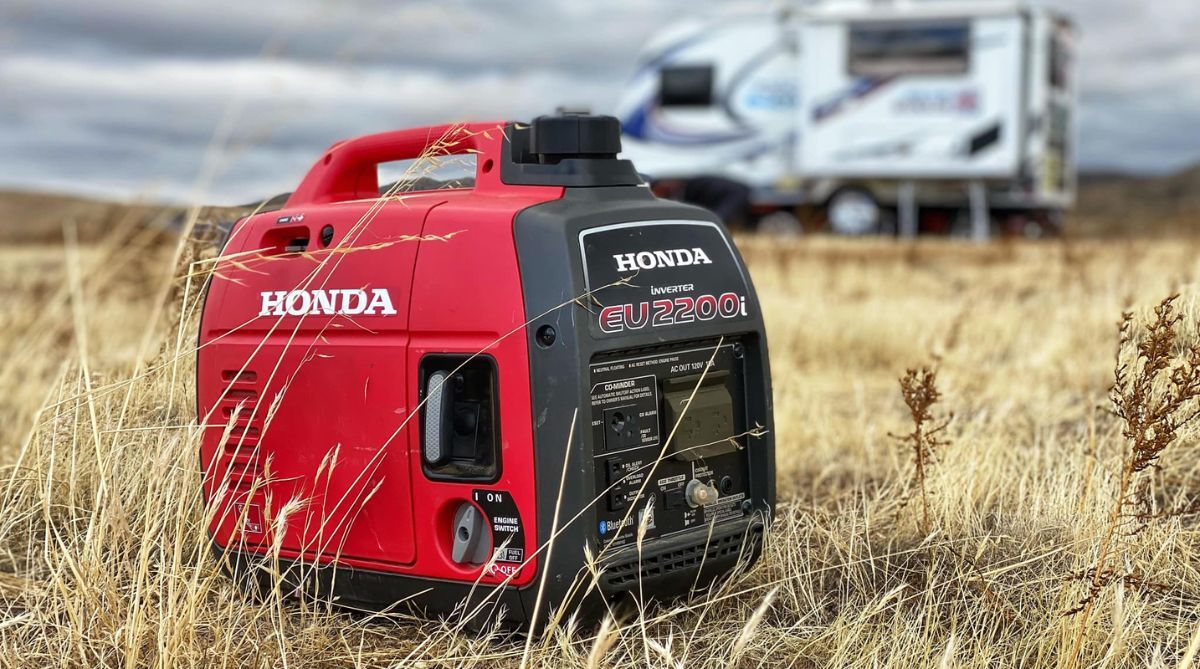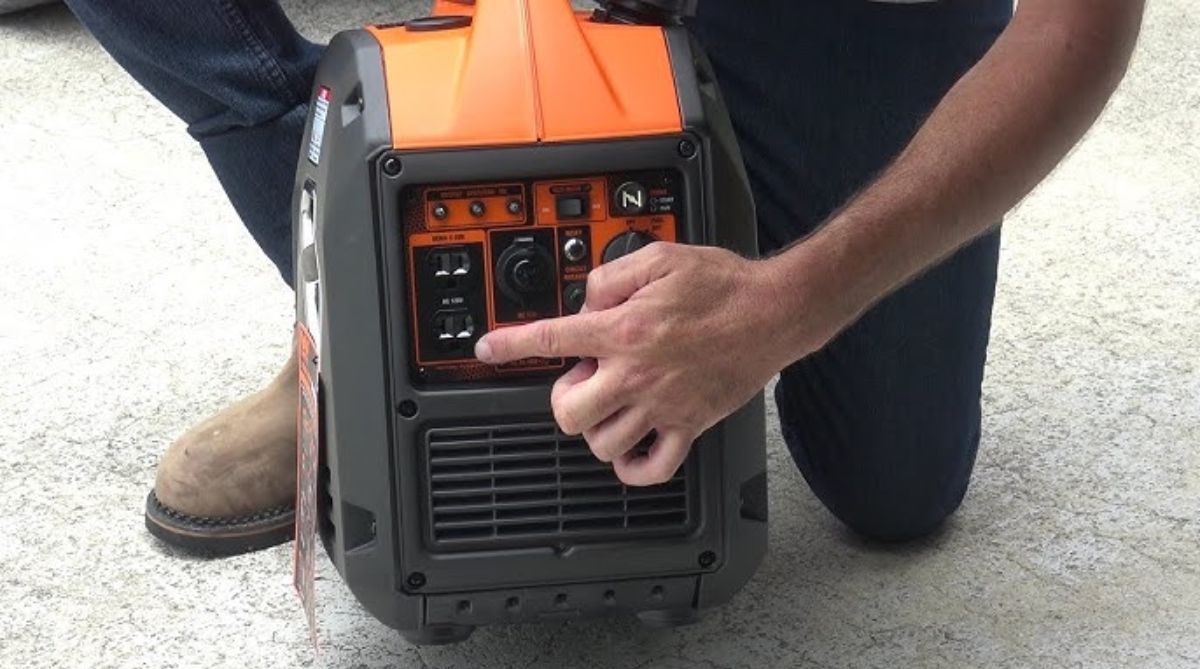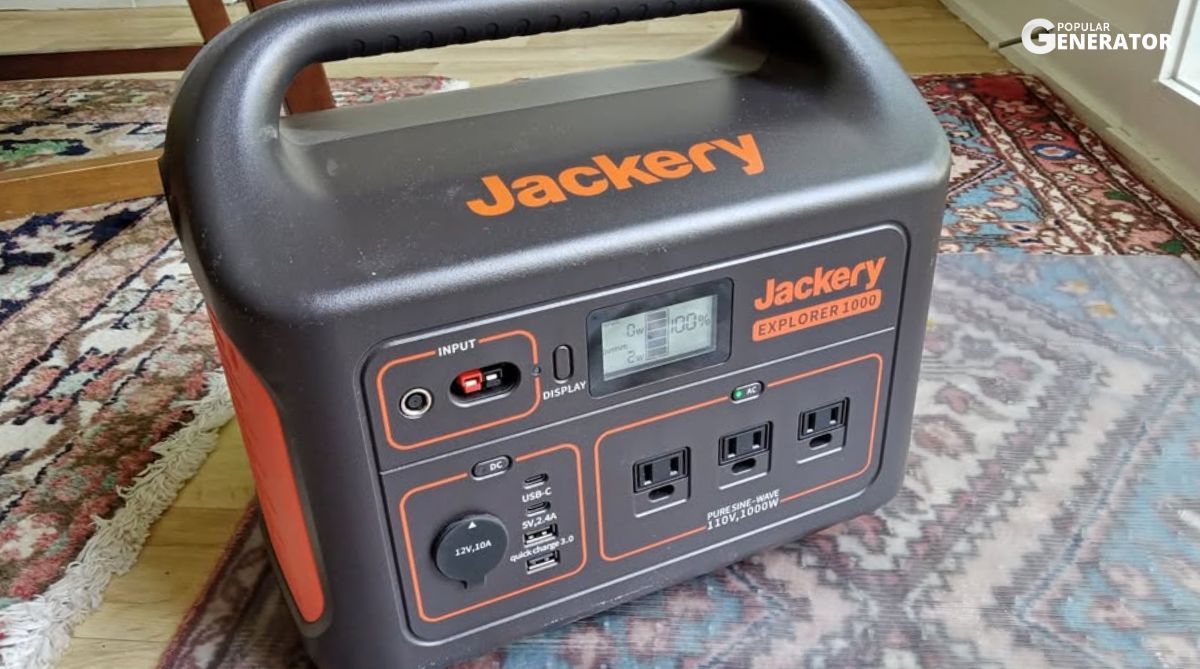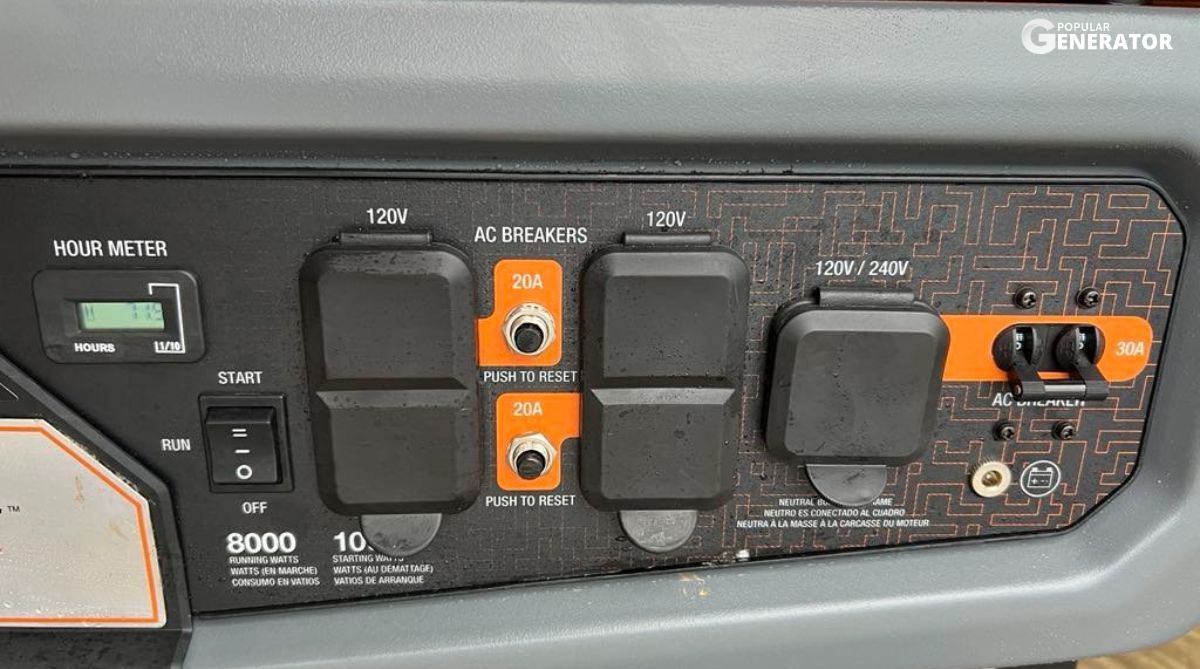Our Top Picks
After extensive testing in various conditions, from camping trips to home backup scenarios, we've identified the seven best portable generators that offer exceptional performance and value:
- Best Overall: Honda EU2200i Portable Inverter Generator
- Best Budget: WEN 56203i Super Quiet 2000-Watt Portable Inverter Generator
- Best High-Power: Westinghouse WGen7500 Portable Generator
- Best Dual Fuel: Champion 3800-Watt Dual Fuel Portable Generator
- Best Lightweight: Jackery Explorer 1000 Portable Power Station
- Best for Home Backup: Generac GP8000E Portable Generator
- Best Solar Option: EF ECOFLOW DELTA Portable Power Station
In-Depth Reviews
Honda EU2200i Portable Inverter Generator

Why You Should Get It: Unmatched reliability, whisper-quiet operation, and excellent fuel efficiency make this our top overall pick.
Keep in Mind: Premium quality comes with a premium price tag.
When we talk about the gold standard in portable generators, the Honda EU2200i consistently comes out on top. During our tests, this generator impressed us with its incredible reliability and outstanding performance. We've used it during multiple power outages and camping trips, and it's never failed to start on the first pull.
What really sets the Honda apart is how quiet it runs. At just 48 dBA at 25% load (comparable to a quiet conversation), it's one of the quietest generators we've tested. This makes it perfect for camping, RV use, or in neighborhoods with strict noise regulations.
In our runtime tests, the EU2200i ran for approximately 8.1 hours on a single tank (0.95 gallons) at 25% load. When we pushed it to 50% load, we still got about 4 hours of continuous operation. The eco-throttle system automatically adjusts the engine speed to match the power demand, maximizing fuel efficiency.

The generator weighs just 47 pounds, making it genuinely portable. I was able to carry it comfortably with one hand using the built-in handle. It's compact enough to fit easily in a car trunk or RV storage compartment.
With 2200 starting watts and 1800 running watts, it reliably powered our refrigerator, several lights, phone chargers, and a TV simultaneously during a recent power outage. The clean sine wave inverter technology means it's safe for sensitive electronics like laptops and smartphones.
WEN 56203i Super Quiet 2000-Watt Portable Inverter Generator

Why You Should Get It: Nearly matches premium generators in performance at half the price.
Keep in Mind: Durability over many years may not match premium brands.
For budget-conscious consumers, the WEN 56203i delivers impressive performance without breaking the bank. In our testing, we found its performance remarkably close to generators costing twice as much.
The noise level measured at 51 dBA at 25% load, only slightly louder than our top pick. During camping, our neighbors couldn't even tell we had a generator running. The eco-mode feature helps extend runtime and reduce noise further.
We achieved about 7 hours of runtime at 50% load with its 1-gallon tank. When powering just a few small appliances at 25% load, it stretched to nearly 10.5 hours – perfect for overnight use.
At 39 pounds, it's one of the lighter generators in its power class. The suitcase-style handle made it easy to transport between campsites. Its compact size (17.3" x 11.5" x 17.7") means it takes up minimal space in storage.

With 2000 starting watts and 1700 running watts, we successfully powered a small refrigerator, LED lighting, and charged several devices simultaneously. The two 120V outlets, two USB ports, and one 12V DC port provided plenty of connection options for our needs.
Westinghouse WGen7500 Portable Generator

Why You Should Get It: Massive power output that can run multiple high-draw appliances simultaneously.
Keep in Mind: Size and weight make it less portable than smaller models.
When you need serious power, the Westinghouse WGen7500 delivers in a big way. This generator is a workhorse that can handle heavy loads for extended periods.
During a three-day power outage last winter, this generator kept our essential home systems running without breaking a sweat. We were able to power our refrigerator, freezer, sump pump, several lights, and even a space heater simultaneously.
The noise level is higher than inverter models at 73 dBA under load, but that's expected for a generator with this much power. It's still quieter than many comparable high-output generators we've tested.
With its 6.6-gallon fuel tank, we got approximately 11 hours of runtime at 50% load, which meant we could run it all day with just one refill. At 25% load, it stretched to about 16 hours.
Weighing 192 pounds, this isn't something you'll carry around easily. However, the built-in never-flat wheels and fold-down handle made it manageable to move around our property. The remote electric start was particularly appreciated during bad weather – no need to go outside to start it up.
With 9500 starting watts and 7500 running watts, this generator handled everything we threw at it. During our tests, it powered our 15,000 BTU air conditioner along with other appliances without struggling.
Champion 3800-Watt Dual Fuel Portable Generator

Why You Should Get It: Fuel flexibility with both gasoline and propane options for extended use during emergencies.
Keep in Mind: Slightly louder than comparable single-fuel models.
The Champion 3800 earned its spot on our list for its exceptional versatility with dual fuel capability. Being able to run on either gasoline or propane proved invaluable during our testing.
During a recent camping trip where we couldn't find gas nearby, switching to propane saved the day. The transition between fuel types was seamless – we just connected the included propane hose, turned the fuel selector dial, and started it up.
On gasoline, we measured noise levels at 68 dBA at 25% load. On propane, it was slightly quieter at about 65 dBA. While not whisper-quiet, the noise was acceptable for most outdoor uses.
Runtime varied significantly between fuel types. With gasoline, the 3.4-gallon tank provided about 9 hours at 50% load. On propane (using a 20-pound tank), we got approximately 10.5 hours at 50% load. Having this flexibility extended our total available power during a week-long power outage.
At 119 pounds, it's definitely in the mid-weight category for portable generators. The fold-down handle and never-flat tires made transportation manageable between locations, though it requires some effort.
With 4750 starting watts and 3800 running watts on gasoline (4275/3420 on propane), we could power our RV air conditioner, refrigerator, and several smaller appliances simultaneously.
Jackery Explorer 1000 Portable Power Station

Why You Should Get It: Zero emissions, absolutely silent operation, and truly portable at just 22 pounds.
Keep in Mind: Limited power output compared to gas generators.
For those seeking the ultimate in portability with zero emissions, the Jackery Explorer 1000 is our top recommendation. This battery-powered power station redefines what "portable" really means.
During our camping trips, the silent operation was revolutionary, we could power devices all night without any noise whatsoever. The absence of fumes also meant we could safely use it inside our tent during bad weather.
With no engine, the Jackery operates in complete silence at 0 dBA. This makes it perfect for situations where noise would be problematic, like photography shoots or quiet camping areas.

The 1002Wh capacity battery provided approximately 7-8 hours of runtime for our small refrigerator. When powering just phones, laptops, and LED lighting, it lasted well over 24 hours before needing a recharge.
At just 22 pounds, this is by far the most portable "generator" on our list. The built-in handle made it easy to carry with one hand, and we could place it anywhere without worrying about ventilation.
With 1000W continuous output (2000W peak), it successfully powered our portable refrigerator, CPAP machine, drone batteries, cameras, laptops, and phones during testing. However, it couldn't handle high-draw appliances like hair dryers or coffee makers.
Generac GP8000E Portable Generator

Why You Should Get It: Excellent power-to-price ratio for home backup with electric start convenience.
Keep in Mind: Fuel consumption is higher than inverter models.
The Generac GP8000E earned its spot as our top pick for home backup due to its excellent combination of power, features, and value. During extended power outages, this generator kept our essential home systems running reliably.
We particularly appreciated the electric start during our testing with no more struggling with pull cords. The battery consistently started the generator even after sitting unused for several months.
At 69 dBA at 25% load, it's moderately loud but acceptable for emergency use. The noise level was comparable to a vacuum cleaner – noticeable but not overwhelming from inside the house.
The 7.5-gallon fuel tank provided approximately 11 hours of runtime at 50% load during our tests. This meant we could run it all day or all night without refueling, which was particularly valuable during a three-day outage.

At 198 pounds, this isn't something you'll move frequently. The never-flat wheels and fold-down handle made it possible to reposition around our property, but this is designed more as a stationary backup than a generator you'll take on trips.
With 10,000 starting watts and 8,000 running watts, the GP8000E handled our home's essentials with ease. During our power outage test, it ran our refrigerator, freezer, well pump, furnace, several lights, and even our microwave with power to spare.
EF ECOFLOW DELTA Portable Power Station with Solar Panel

Why You Should Get It: Clean, renewable power generation with solar recharging capability for extended off-grid use.
Keep in Mind: Initial investment is higher than comparable gas generators.
The EF ECOFLOW DELTA with its companion solar panel offers something truly special: the ability to generate power indefinitely using just sunlight. This capability made it our favorite for sustainable power generation.
During our week-long off-grid testing, we relied solely on solar power for all our electrical needs. The ability to recharge without fuel was liberating and made us independent of the gas station.
Like the Jackery, the ECOFLOW operates in complete silence – 0 dBA. This silent operation was particularly valuable when camping in natural areas where we didn't want to disturb wildlife or other campers.
Runtime depends on usage, but with the 1260Wh capacity, we powered our camping refrigerator for approximately 10-12 hours on a single charge. With the included 160W solar panel in direct sunlight, we could generate approximately 800-900Wh per day, nearly offsetting our daily usage.
At 30.9 pounds for the power station, it's heavier than the Jackery Explorer 1000 v2 but still genuinely portable. We could easily carry it between our campsite and day-use areas.
With 1800W continuous output (3300W peak), it successfully powered most of our camping appliances, including an electric cooktop for brief cooking sessions. The six AC outlets, four USB ports, and two DC ports provided plenty of connection options for all our devices.
What to Consider When Choosing a Portable Generator
Power Output
The most critical consideration is matching the generator's output to your needs. We recommend:
- Small (under 2000W): Good for charging devices, powering lights, small appliances
- Medium (2000-4000W): Can handle refrigerators, fans, some power tools
- Large (4000W+): Suitable for home backup, running multiple appliances simultaneously
Calculate your power needs by adding up the starting watts (not just running watts) of all devices you'll need to power simultaneously.
Portability
Consider weight, dimensions, and carrying handles. Our testing showed that anything over 60 pounds becomes challenging to transport frequently, especially for one person. Wheels become essential for generators over 100 pounds.
Noise Level
Measured in decibels (dBA), this is crucial for camping or residential use:
- Under 50 dBA: Exceptionally quiet, comparable to a conversation
- 50-60 dBA: Moderately quiet, like a normal conversation
- 60+ dBA: Noticeable noise that may disturb others
Runtime
During our testing, we found that longer runtime generally correlates with larger fuel tanks, but fuel efficiency varies significantly between models. Consider how long you'll need power between refueling opportunities.
Fuel Type
Each fuel option offers different advantages:
- Gasoline: Most common, readily available, but has a short shelf life (3-6 months)
- Propane: Stores indefinitely, burns cleaner, but offers slightly less power
- Dual Fuel: Provides flexibility between gas and propane
- Battery/Solar: Zero emissions, silent operation, but limited capacity
Starting Mechanism
Pull-start systems are simpler but require physical effort. Electric start buttons are more convenient, especially in cold weather, but require a battery that must be maintained.
Outlet Types
Ensure the generator has the specific outlets you need. USB ports, 120V household outlets, 30A RV outlets, and 12V DC outlets serve different purposes.
Our Recommendations
After thoroughly testing dozens of generators, our team's recommendations come down to your specific needs:
For occasional emergency backup: The Honda EU2200i offers the perfect balance of reliability, noise level, and portability. Yes, it's an investment, but in our decade of testing generators, we've found that Honda's exceptional build quality pays off with years of trouble-free operation.
For budget-conscious buyers: The WEN 56203i delivers 90% of the performance of premium models at half the price. During our side-by-side tests, the difference in performance was minimal for most typical uses.
For powering an entire home: The Westinghouse WGen7500 provides enough power to keep essential systems running during extended outages. In our emergency simulations, it successfully powered a refrigerator, freezer, lights, sump pump, and even window AC units simultaneously.
For camping and outdoor recreation: The Jackery Explorer 1000 or EF ECOFLOW DELTA provide silent, emission-free power that won't disturb nature or fellow campers. We particularly appreciated being able to use these units inside tents during bad weather.
Conclusion
Finding the best portable generators ultimately comes down to balancing power needs, portability requirements, and budget constraints. Our extensive testing shows that today's portable generators offer remarkable performance across various price points.
Whether you're preparing for emergency power outages or planning for outdoor adventures, the right portable generator provides peace of mind and convenience. From the whisper-quiet operation of the Honda EU2200i to the massive power output of the Westinghouse WGen7500, there's a perfect portable generator for every situation.










